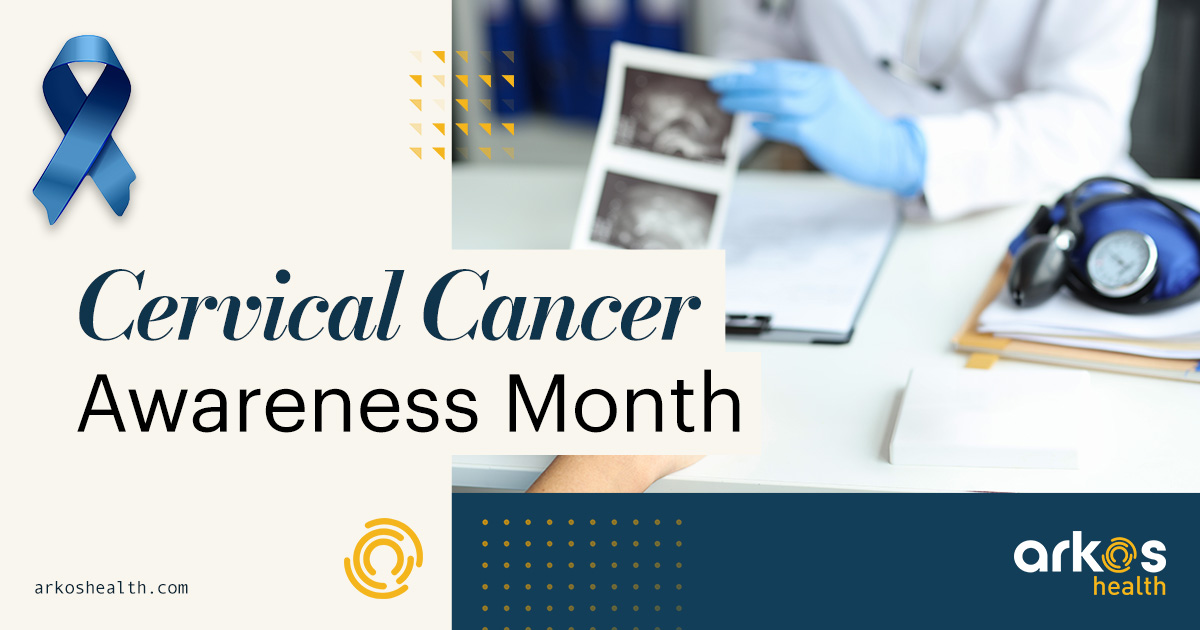
January is cervical cancer awareness month, and this year, the Arkos team is here to lend a helping hand as best as we can. As we continue to advocate for how essential early screenings and testing can be in both detecting and treating cervical cancer, our team is here to provide the critical knowledge and resources for women all around the globe to be able to take more control over their own health.
Cervical cancer is cancer that starts in the cells of the cervix, and usually develops slowly over time. Before cancer appears in the cervix, the cells of the cervix go through changes known as dysplasia, in which abnormal cells begin to appear in the cervical tissue. Over time, if not destroyed or removed, the abnormal cells may become cancer cells and start to grow and spread more deeply into the cervix and to surrounding areas.
In 2023, roughly 13,960 new cases of invasive cervical cancer were diagnosed, and 4,310 women died from cervical cancer globally. In the United States alone, cervical cancer ranks as the 14th most frequently diagnosed cancer, and jumps to 4th most frequent for women between the ages of 15 and 44.
The commonality of this dangerous ailment is mainly due to the variety of factors that could play a role in the development of the cancer. As with many forms of cancer, there is no one direct factor, with life aspects such as smoking, immune system strength, and familial medical history, among others, all potentially increasing one’s risk for cervical cancer.
However, in the case of cervical cancer, human papillomavirus (HPV) has been found to be a strong trigger of the ailment. Two high-risk types, HPV 16 and HPV 18, cause 70% of cervical cancers worldwide. When a high-risk HPV infection lasts for years, it can lead to changes in the cervical cells, resulting in a precancerous lesion, which when not found and removed, may eventually develop into cervical cancer.
Unfortunately, cervical cancer is challenging to diagnose, due to its asymptomatic qualities during both pre-cancer, and early stages.
Symptoms often do not begin until the cancer becomes larger and grows into nearby tissue. These symptoms can be wide-ranging, and may manifest as abnormal vaginal bleeding, swelling in the legs, trouble urinating or having a bowel movement, or the possibility of blood in the urine.
These symptoms are common in all forms of cervical cancer, like squamous cell carcinomas, which is the most common form, with on average 9 out of 10 cases being this type. They may also manifest in the less common forms of cervical cancer, such as adenocarcinomas, and adenosquamous carcinomas or mixed carcinomas.
Thankfully, pertaining to all forms of cervical cancer, it is one of the most successfully treatable forms of cancer, but only when it is detected early and managed effectively. Considering how manageable and treatable the disease can be when diagnosed early enough, it is imperative for women of all ages to ensure they are taking part in routine screenings.
Recent studies have found that a screening interval of either three to five years was the most effective timescale for routine screenings, however, it is important to discuss your intervals with a medical professional based on your risk factors and medical history.
Whether it is the HPV test, which looks for pieces of high-risk HPV in cervical cells, or the Pap test, in which doctors collect cells from the cervix to analyze in a lab setting, both can play an essential role in detecting cervical cancer as early as possible.
Using these screening methods, women who had regular screenings at a three to five year pace were 46 to 66 percent less likely to develop cervical cancer, and 54 to 72 percent less likely to pass away due to the disease, as opposed to those who did not participate in regular screenings.
The American Cancer Society has already released a set of screening guidelines they recommend women to follow. These include starting screenings at the age of 25, and continuing routine checks at minimum every five years until the age of 65. Once 65 has been reached, women who have had regular screening in the past 10 years with normal results and no history of CIN2 or more serious diagnosis within the past 25 years can stop getting screened, and have no need to start again.
“Cervical cancer is one of the leading causes of cancer death for women in the United States. Early detection through screening tests provides the best chance to catch cervical cancer early or catch abnormal cells before they become cancerous,” stated Dr. Sibrava, Executive Vice President of Medical Affairs at Arkos, and a doctor of osteopathic medicine, who believes there’s more to good health than just the absence of pain or disease.
To Dr. Sibrava, healthcare is a lifestyle, sporting over thirty years of experience in various positions within the medical field. Having started as an EMT prior to med school, Dr. Sibrava has worked with both inpatient and emergency psychology, as well as time as a case manager for children services.
Thanks to her diverse background, Dr. Sibrava brings a holistic approach to healthcare, where all a patient’s needs, not just physical, are taken into account. With her thirty plus years of medical experience in clinical practice, population health and managed care service, Dr. Sibrava is committed to advancing women’s health through awareness and communication, to provide a more seamless care experience, resulting in better health outcomes for women of all ages, around the world.
“As women, we know our days get busy, but we need to take the time to take care of ourselves. In January, Cervical Cancer Awareness Month, take the time for yourself and make the appointment. Pass on this message and empower each other to make your health a priority.”
This year, even beyond January, the Arkos team is thoroughly committed to building healthier communities by improving access to HPV vaccination, screening, treatment for cervical pre-cancer and management of cervical cancer. Our care support teams are here to aid our members, by inviting them to connect with their local care support team to get a screening scheduled today, as together, with a comprehensive approach to prevent, screen and treat, we can end cervical cancer as a public health problem within a few generations.
BY Arkos Insights
Published January 31, 2024 2:04PM


